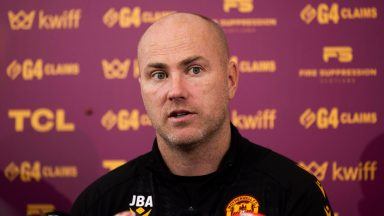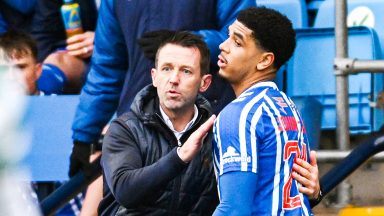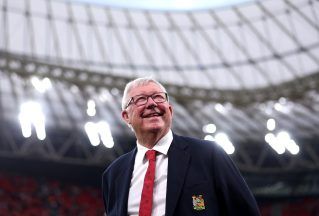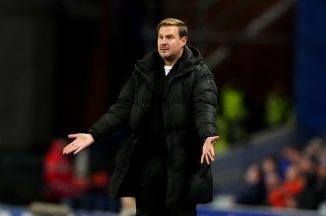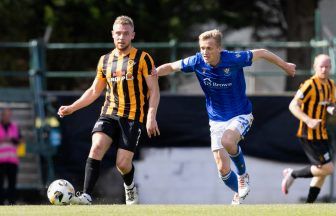As curtain raisers go, it was pretty low key.
There was little drama on Tuesday as Steve Clarke revealed his Scotland squad to face Israel in next week’s Euro 2020 play-off semi-final, but the announcement drew focus to arguably the national team’s greatest opportunity in 17 years.
Back then, in 2003, a play-off against Netherlands offered a chance to reach the Euros and after a 1-0 win in Glasgow raised hopes beyond reason, a 6-0 defeat to a surgical Dutch side (re-)introduced fans to the theatre of cruelty.
Since then, as World Cup cycle followed Euros cycle, the side in dark blue has seen qualification campaigns end in sporting tragedy or comedy, or some grotesque combination of the two.
Next Thursday, Clarke can take Scotland one step closer to the biggest stage, with a win against Israel putting the team 90 minutes away from a first bow at a major finals since 1998. Assembling a squad is only the first part and the performance might define his time at Hampden.
The former Kilmarnock boss wasn’t responsible for the booking, of course. It was Alex McLeish who led Scotland to win their Nations League group and secure the play-off spot. It was only supposed to be insurance, a ‘Break in case of emergency’ if the team failed to make it through the proper qualifiers.
Looking ahead to next week’s game, the key to a showdown with Norway or Serbia in the final, is an invitation to look back to a match in November 2018 where McLeish’s side won 3-2 to ensure a second chance at reaching the Euros.
The opposition? Israel. The location? Hampden. The squad? The key players? The pressing issues? Different and the same.
Scotland’s three goals that night were created by Ryan Fraser and Ryan Christie, with both in the squad this time around. Fraser has been recalled after missing the last international camp because he was without a club when the season started. A Bournemouth player then, a new recruit at Newcastle now, he could be a significant addition to Clarke’s armoury.
Christie and Fraser’s creativity that night allowed James Forrest to help himself to a first hat-trick in a Scotland shirt. The Celtic star was absent from Clarke’s list of players this time around, injured and leaving his international boss the first of several questions to be answered next week.
It isn’t the most pressing and those that are the most concerning were unresolved issues two years ago when the play-off place was earned.
Back then, McLeish named a back line of Andy Robertson, Scott McKenna, David Bates and Callum Paterson. It was only the latest attempt to find a defence that might stand up to the acute stresses of international football and the fact that Bates isn’t in the latest squad, while Paterson is included primarily as a forward is all you need to know.
Kieran Tierney was injured back then, sparing McLeish the question of how to accommodate him and Robertson in the same team.
Clarke’s approach, judging by the recent double-header against Israel and Czech Republic, is to keep his captain wide and make Tierney one of a back three, as he is growing used to at Arsenal. It looks like it could work but Manchester United midfielder Scott McTominay being pressed into action in the back three doesn’t. Clarke claims his players are “comfortable with the two systems we’ve given them” but he has a decision to make about his defensive shape and personnel.
Ryan Porteous, a surprise call-up, is unlikely to take McTominay’s place with the manager at pains to explain that the defender was suspended from under-21 games but could join the senior team and benefit from the experience. It would be a surprise if the Hibs stopper was pitched in against Israel but he may get his chance against Slovakia or Czech Republic after the main event.
The other area where Clarke faces the same puzzle as his predecessor is in the striker’s position. McLeish opted for Steven Fletcher but the veteran forward failed to get in on the act as Forrest helped himself to goals.
Fletcher didn’t make Clarke’s squad but the manager was happy to talk about the options he did have at his disposal. Lyndon Dykes returns after his decision to commit to Scotland over Australia brought him a goal in his second appearance last month. Oli Burke is in having found playing time at Sheffield United, while club teammate Oli McBurnie is back having found fitness. Paterson is an alternative for Clarke and Lawrence Shankland an appealing choice now the Dundee United striker is fit again.
It’s a varied selection with different strengths but a glaring concern. The five forwards in the squad have three international goals between them and none have scored double figures in a season in a top-flight professional league. For reference, Israel forward Eran Zahavi has 20 international goals from his 54 caps. Potential play-off final opponents Norway can call upon Erling Haaland who has as many international goals as all the Scotland strikers combined. He scored them in just four games. He’s only 20.
Headaches at the back and questions about who can deliver goals at the sharp end are nothing new for a Scotland manager. Clarke has experimented with varying success in both areas but he has to get it right this time with little time to prepare.
The manager seemed unruffled when asked if he had concerns about the lack of preparation time with some players, saying that the groundwork had been laid in previous international camps. There’s a plan in place and Clarke has had a long, long time to prepare for a situation he knows can light a fire under the team and usher in a new period of optimism, or see another missed opportunity leave the nation debating the same old issues.
Next week it all has to come together. The manager has assembled his cast and now comes the hard part: making sure it all goes to script.


















